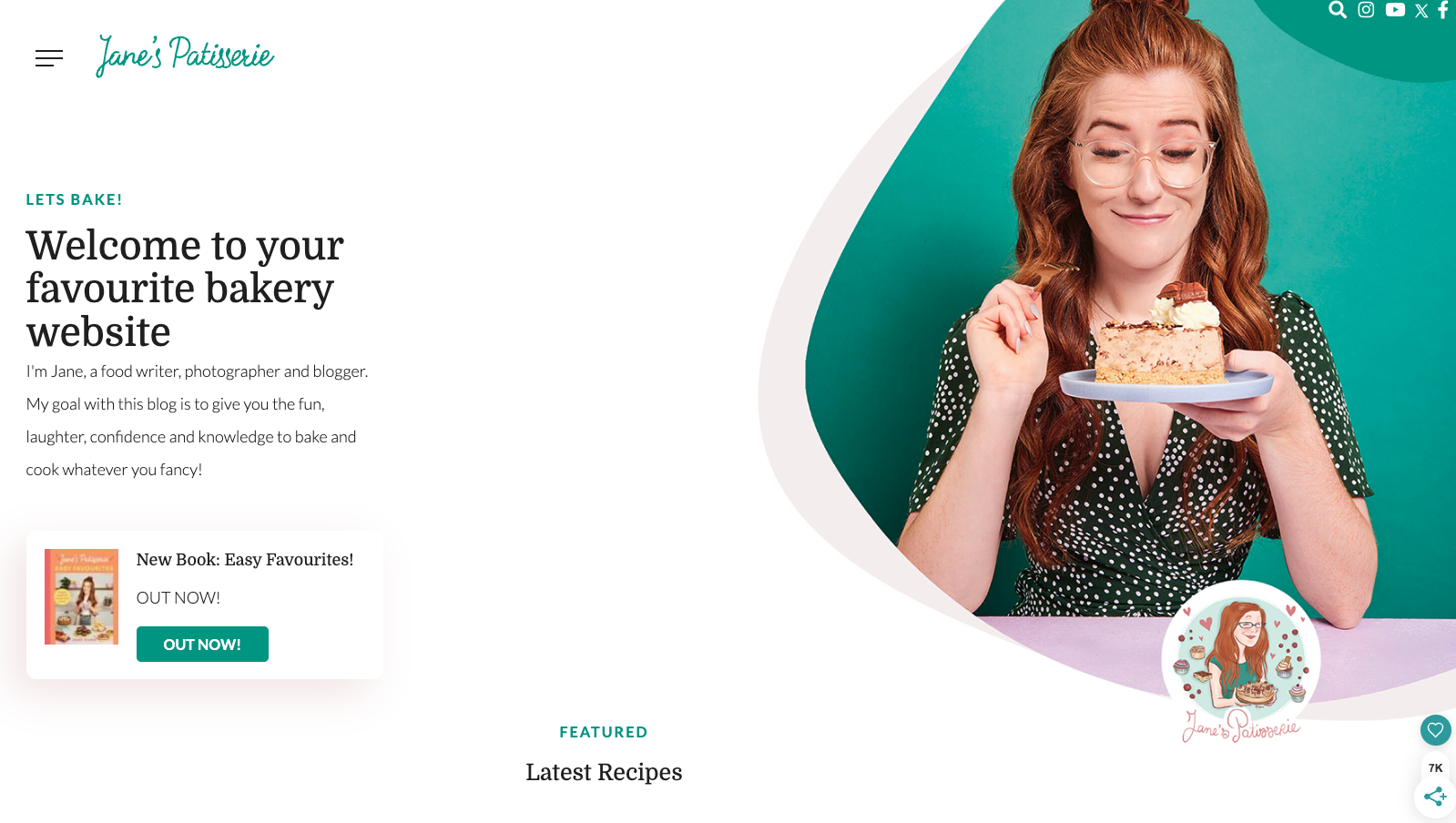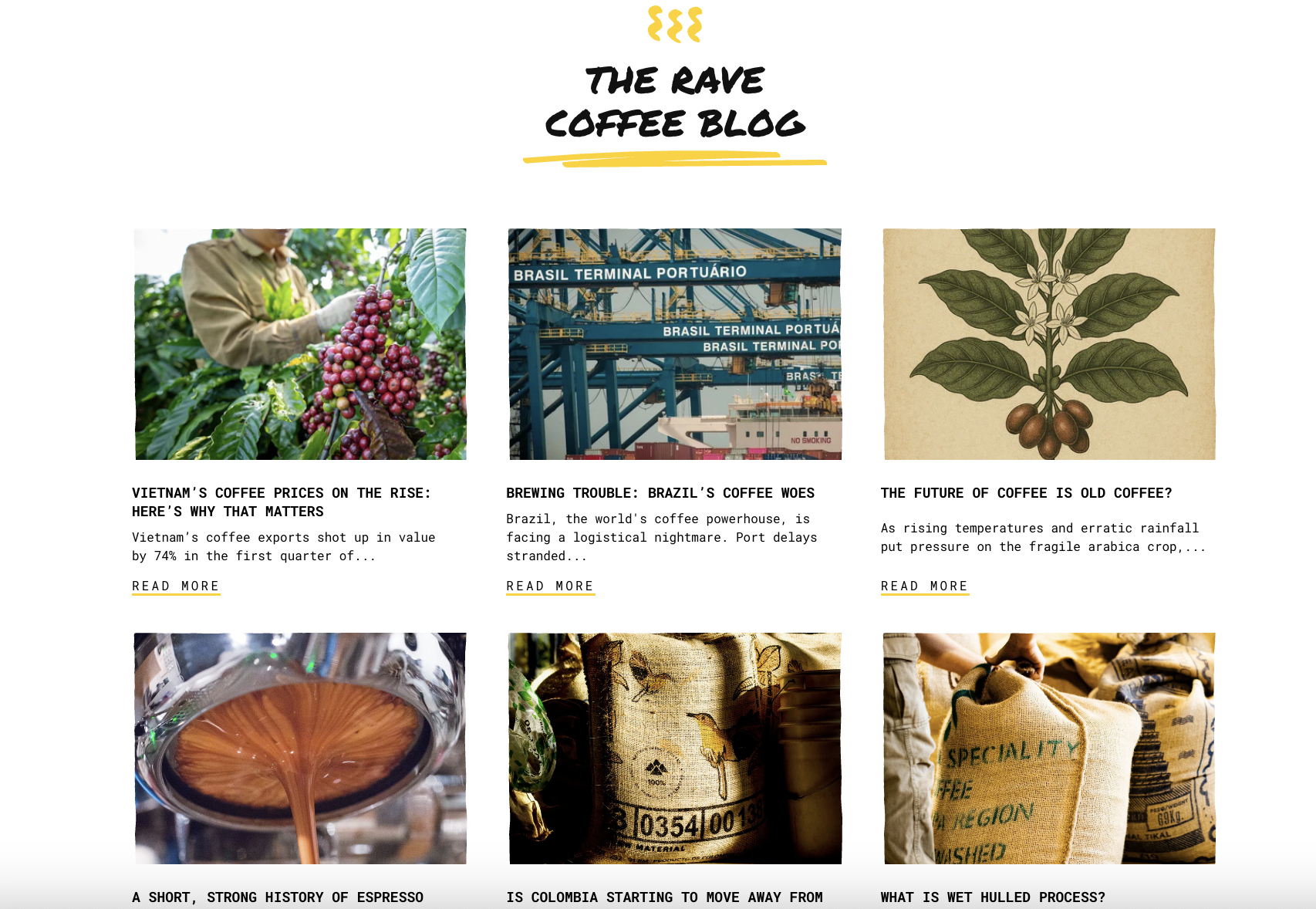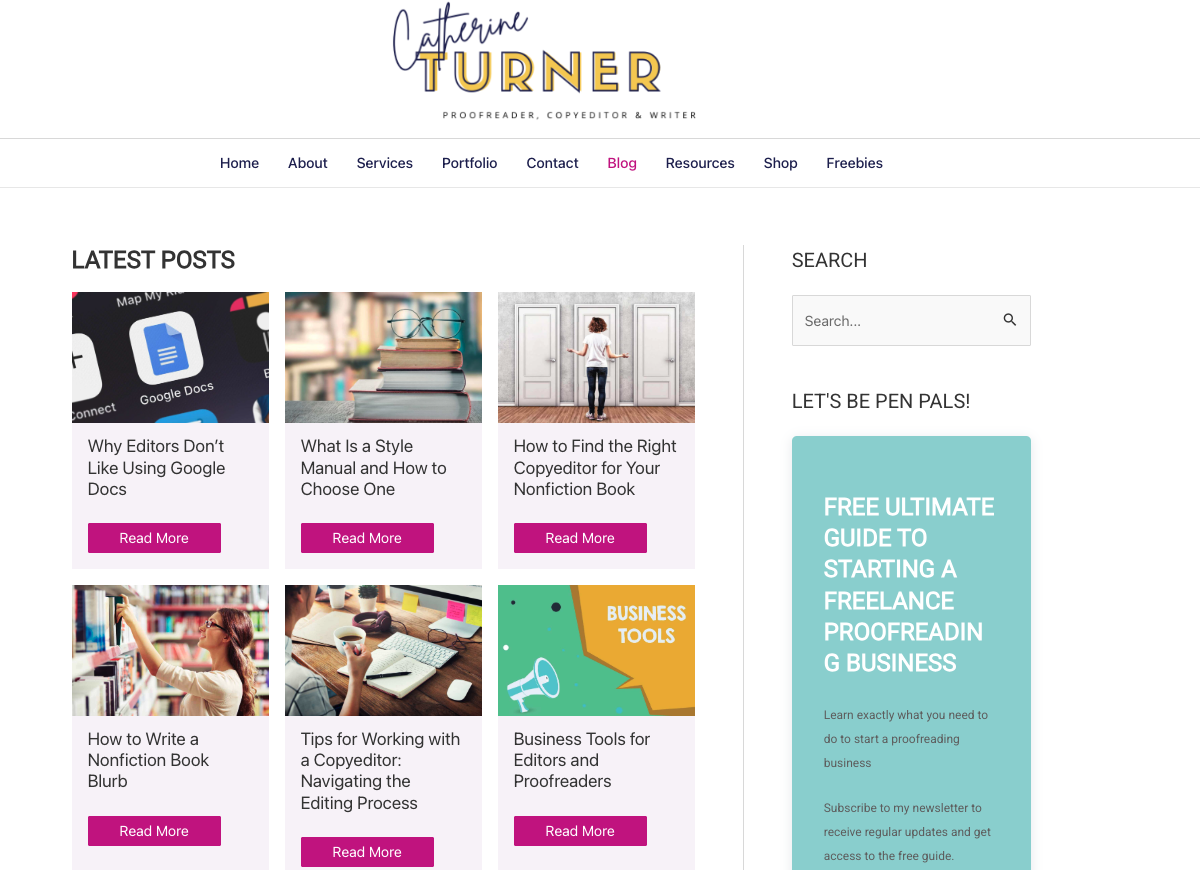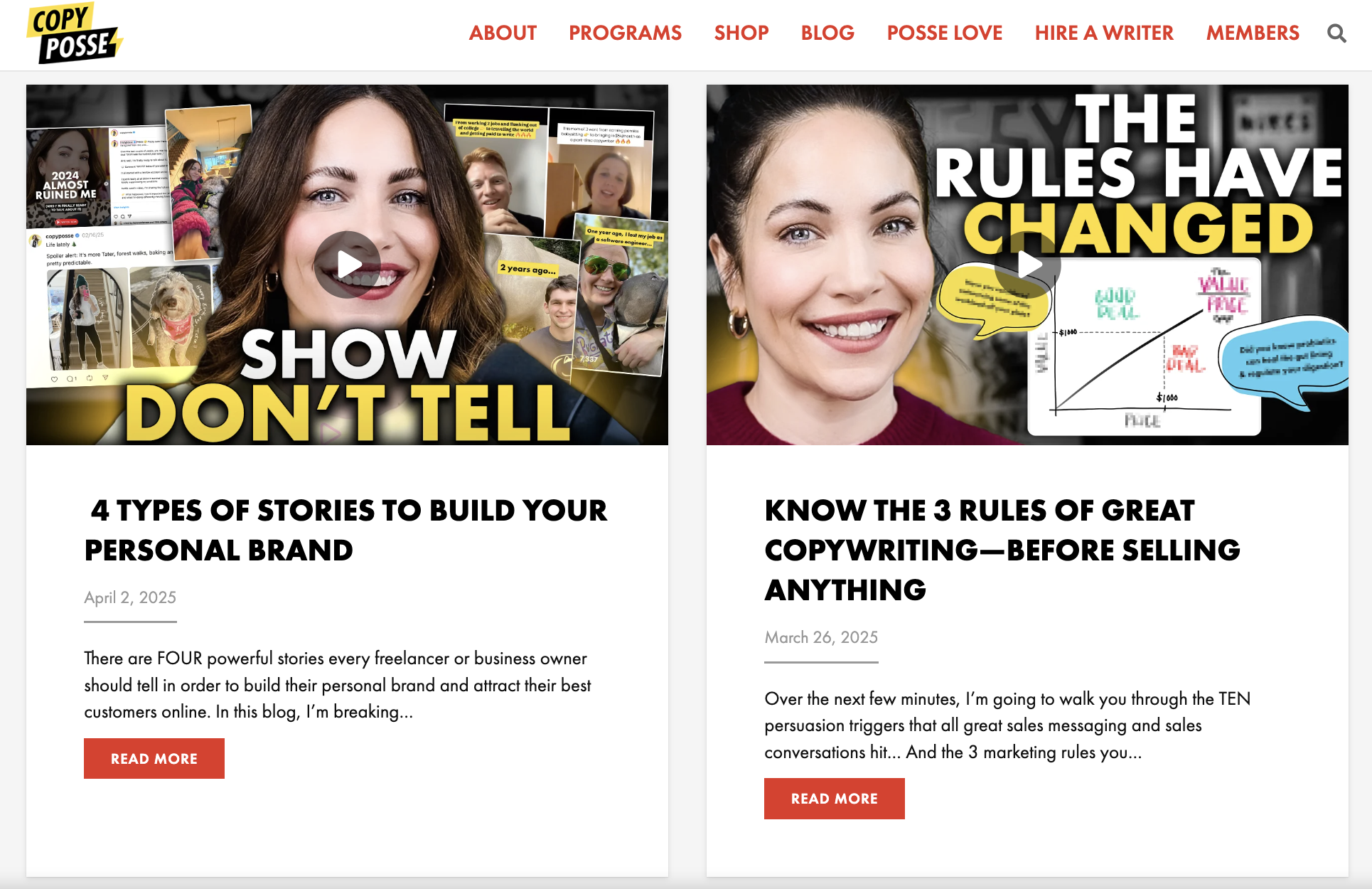
7 Benefits of Blogging for Small Businesses and Freelancers
There are lots of great benefits of blogging for small businesses and freelancers. Blogging can help you attract potential clients or customers, build trust, and increase visibility for your products or services.
If you’re thinking about starting a blog for your business, you’ve come to the right place! In this post, we’ll explore how blogging can help you, as a small-business owner or freelancer, to:
- Drive traffic to your website
- Create brand awareness
- Build customer trust
- Establish yourself as a thought leader
- Increase search engine optimization (SEO)
- Help customers understand your products or services
- Create social media posts from your blog copy
Read on to find out more!
1. Drive Traffic to Your Website
If potential customers don’t know you exist, they’re not going to buy from you. Blogging is one of the most effective ways to increase visibility and attract visitors to your website. In fact, data shows that 83% of internet users read blog posts – that’s about 4.44 billion people! The popularity of blogs makes them a valuable resource you can tap into to grow your freelance career or small business.
The more visitors you attract, the greater your chances of converting them into clients or customers. Once someone lands on your site through a blog post, they’re likely to stick around – browsing your product or service pages, filling out a contact form, or subscribing to your mailing list. What starts as a casual read can quickly turn into a valuable business interaction.
2. Create Brand Awareness
Creating brand awareness is a critical step in raising the profile of your small business or your freelance services. As well as increasing the number of visitors to your website, blogging can help you shape and showcase your brand voice and identity – the personality and values that set you apart.
Blogging provides an opportunity to engage with both existing and potential customers and tell them who you are and what you stand for. And, of course, why they should be interested in paying for your product or service.
Whether you’re witty and informal or expert and authoritative, your blog can reinforce that identity and build familiarity over time.
A great example of this is Jane’s Patisserie, a blog created by Jane Dunn, a food writer, photographer, and blogger. Through her approachable tone, high-quality photography, and tried-and-tested recipes, Jane has built a brand that feels both professional and personal:

What started as a personal blog has since grown into best-selling cookbooks and a loyal online following, all grounded in a strong, consistent brand voice.
3. Build Customer Trust
Attracting customers is only half the battle. Getting them to return is just as important. And to earn that loyalty, you need to establish trust: in you, your message, and the products or services you provide.
Well-written, informative, engaging blog posts are a powerful tool for building relationships. When readers feel they understand your values and see the person behind the business, they’re more likely to stick around, make repeat purchases, and recommend you to others.
That doesn’t mean every blog post needs to be overly salesy. In fact, overly sales-focused content can feel inauthentic and erode trust. Instead, focus on creating content that’s informative, engaging, and relevant to your niche.
For example, RAVE Coffee, an independent UK-based coffee roaster, uses its blog to explore topics such as ethical sourcing, sustainable packaging, and how to brew the perfect cup at home. Posts like “Vietnam’s Coffee Prices on the Rise: Here’s Why That Matters” and “Meeting the Makers: Our Journey to El Carmen” help educate customers while reinforcing the brand’s commitment to transparency, quality, and global community:

This kind of content builds trust by showing that RAVE isn’t just selling coffee – it is sharing its values and inviting customers along for the journey. Thoughtful blogging like this helps people buy into your brand, not just your product.
4. Establish Yourself as a Thought Leader
As well as building customer trust, blogging can help you establish yourself as a thought leader. Thought leadership content is content that demonstrates expertise or innovation within a particular industry, niche, or field.
It’s about doing more than answering basic questions on things such as your pricing or refund policy. It’s showing customers how your products or services will address their pain points and solve their problems. And, educating them on issues that are relevant to the industry you operate in.
Consistency is key. A steady stream of thoughtful, well-researched posts builds your reputation and signals to both customers and peers that you’re a go-to expert in your field. And don’t forget to interact with your readers. Responding to blog comments or questions shows that you’re not only knowledgeable but also engaged, approachable, and invested in your community. That extra effort can turn casual readers into loyal clients.
A good example of thought leadership in action is Turner Proofreading, whose blog shares expert guidance on everything from the nuances of British versus American English to the value of using a professional proofreader:

By adopting a clear, confident, and approachable tone, the blog demonstrates deep subject-matter expertise while educating readers – helping potential clients see the value of their service before they even get in touch.
5. Increase Search Engine Optimization (SEO)
One of the most impactful ways blogging drives traffic to your website is by boosting your SEO. Every blog post you publish gives search engines more content to index and more opportunities for your site to appear in search results.
First, high-quality blog content allows you to meet Google’s E-E-A-T guidelines by demonstrating experience, expertise, authoritativeness, and trustworthiness. As we’ve covered above, well-written blog posts are a great way to showcase your knowledge, share insights, and build credibility – all factors that improve your rankings in search.
Second, blog posts give you a natural place to include relevant keywords – the terms your audience is actively searching for. For example, a post on kids’ party ideas might include search-friendly phrases such as “easy party food” or “kids party food,”. Using keyword research tools can help you identify what people are actually typing into Google. Just be sure to integrate keywords naturally, as Google can spot (and penalize) obvious keyword stuffing.
Finally, “content freshness” also plays a role in how your blog ranks. Search engines prioritize up-to-date, consistently published content. This means that regularly posting evergreen blog posts and updating older or time-sensitive articles can help you maintain visibility in search results.
For more tips, check out our post: How to Write SEO-Friendly Blog Posts.
6. Help Customers Understand Your Products or Services
Blogging is a powerful way to educate your audience about what you offer. It gives you the space to explain how your products or services work, highlight their benefits, and demonstrate the value behind them.
For example, if you own a clothing business, you could blog about how to accessorize an outfit. If a customer has bought a black dress, your blog might encourage them to come back for that statement necklace to show off the neckline. You’ve helped your customer learn more about putting together a great outfit, and they’ve learned that you know your stuff. Win-win!
If you offer a service, your blog can be just as effective. For instance, if you’re a freelance copywriter, you could publish posts explaining what makes a great headline, how persuasive copy drives conversions, or the role of tone of voice in brand identity. This kind of content helps demystify your service, shows the strategic thinking behind your work, and positions you as an expert clients can trust to communicate their message effectively.
Take Alex Cattoni’s Copy Posse blog, for example. Her posts dive into topics such as high-converting email sequences, branding tips, and the psychology behind great sales copy:

With an energetic, conversational style and a knack for breaking down complex concepts, she demonstrates her expertise while helping her audience better understand what great copy can do for their business. It’s a perfect example of how blogging can educate potential clients and position you as the go-to expert in your field.
7. Create Social Media Posts from Your Blog Posts
Marketing your business is crucial to your success, but you still need time to do all the other stuff involved in running a business. And it’d be nice to have a life too, right? After all, one of the major benefits of being a freelancer is the flexible work-life balance.
That’s where content repurposing, also known as content recycling, comes in. Instead of creating something new from scratch every time, you can take a single blog post and adapt it for multiple platforms. Why write something several times if you can write it just once?
For example, pull a quote, tip, or stat from one of your most popular blog posts, and turn it into a LinkedIn caption, a post on X, or a short Instagram reel. Share the original blog link alongside it to drive traffic back to your site.
There are lots of social media management tools that make this process quick and easy. Many can even be set up to post your blog content automatically at a scheduled time!
Ready to Start Blogging Like a Pro?
If this post has sparked your interest in blogging – and you want to learn how to do it effectively – our Becoming A Freelance Writer course is the perfect place to start. You’ll gain practical, step-by-step training in how to write compelling blog content that drives traffic, builds trust, and positions you (or your clients) as a thought leader. Try it out for free today!





Your email address will not be published.